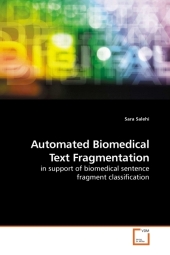 Neuerscheinungen 2010Stand: 2020-01-07 |
Schnellsuche
ISBN/Stichwort/Autor
|
Herderstraße 10
10625 Berlin
Tel.: 030 315 714 16
Fax 030 315 714 14
info@buchspektrum.de |

Sara Salehi
Automated Biomedical Text Fragmentation
in support of biomedical sentence fragment classification
2010. 120 S.
Verlag/Jahr: VDM VERLAG DR. MÜLLER 2010
ISBN: 3-639-21627-X (363921627X)
Neue ISBN: 978-3-639-21627-1 (9783639216271)
Preis und Lieferzeit: Bitte klicken
The past decade has seen a tremendous growth in the amount of biomedical literature, speci cally in the area of bioinformatics. As a result, biomedical text categorization has become a central task for providing researchers with literature appropriate for their speci c information needs. Pan et al. have explored a method that automatically identi es information-bearing sentence fragments within scienti c text. Their proposed method aims to automatically classify sentence fragments into certain sets of categories de ned to satisfy speci c types of information needs. The categories are grouped into ve different dimensions known as Focus, Polarity, Certainty, Evidence, and Trend. The reason that fragments are used as the unit of classi cation is that the class value along each of these dimensions can change mid-sentence. In order to automatically annotate sentence fragments along the ve dimensions, automatically breaking sentences into fragments is a necessary step. In this study, we investigate the problem of automatic fragmentation of biomedical sentences, which is a fundamental layer in the multi- dimensional fragment classi cation.
Sara Salehi grew up in Iran, now lives in Canada. She recently received her MSc from Queen´s University at Kingston. The main focus of her research was text mining and machine learning. Sara is currently a PhD candidate at Queen´s University doing research in computer assisted surgery.


